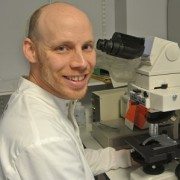Funding of a fluorescent microscope as a vital tool for the ongoing research and diagnosis of A-T and A-T-related disorders
Equipment information
Principal researcher: Professor Grant Stewart
Institute: University of Birmingham
Cost: £37,810.25
Date: February 2016
What are the researchers proposing to use the microscope for and why?
There are two ways Grant and his team propose to use the microscope:
Firstly, the team will use the microscope for a long-standing research project ongoing at the University of Birmingham. The project looks to identify all the ATM mutations in all the A-T patients in the UK, establish the impact of the individual mutations on ATM protein level and function and to relate this to disease severity (particularly the neurological deficits and tumour susceptibility associated with A-T). In addition to research, the microscope will be used to provide a genetic diagnosis of either A-T or an A-T-related disorder for patients in the UK.
How will the microscope be used?
For A-T genetic diagnosis in the UK, to sequence the ATM gene, for A-T-based research relating to disease severity and prognosis prediction, to look at ATM processes of DNA damage and repair, and for identifying novel genes that when mutated give rise to an A-T-like disorder. These approaches would be carried out in combination with targeted gene sequencing and/or whole genome sequencing.
How could it make a difference to the lives of those affected by A-T?
The ongoing research project continues to accrue data and aims to be able to provide a prognostic prediction to a patient and their family as well as a prediction on the disease severity/progression in that individual patient. The University of Birmingham is also the only NHS accredited laboratory in the UK that provides genetic confirmation of the clinical diagnosis of A-T and other A-T-related disorders. The primary and most important benefit to patients is that they can provide them with this confirmation of diagnosis. Firstly, this information helps the affected patients and their families to understand their disease, what the prognosis is and what the various problems are that will be encountered on a day-to-day basis when living with this disease. Secondly, this confirmation is invaluable to the clinician involved in treating the patient because it will allow him/her to make informed decisions about how best to help the patient/family manage the disease. It also enables the family to understand what the likely clinical complications could be and what the available treatment options are to aid in alleviating some of the clinical symptoms associated with the disorder. Lastly, this information is essential for genetic counselling and prenatal screening.
The microscope was funded thanks to a sizeable grant from the Allergan International Foundation, the generous support of everyone who took part in our 2015 Christmas Campaign and contributions in 2016 from CHK Charities Ltd and the Lillie Johnson Charitable Trust.






